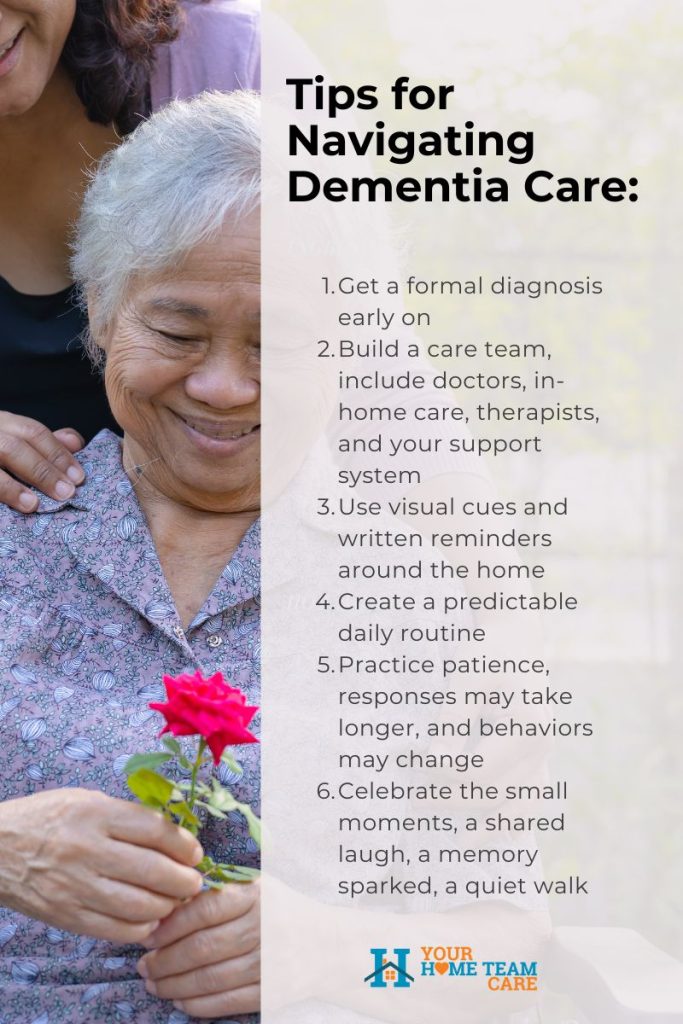Let’s take a deep breath together and unpack some of the most common myths about dementia care, and what you really need to know instead.
When a loved one is diagnosed with dementia, it can feel overwhelming, confusing, and even a little frightening. Families are suddenly thrown into a world filled with medical terms, care decisions, and strong emotions, all while trying to separate fact from fiction.
At Your Home Team Care, we’ve supported hundreds of families through these moments, and one thing we’ve learned is this: misunderstandings about dementia care are incredibly common. These myths can make the journey harder than it needs to be, causing unnecessary stress, guilt, or delays in getting the right support.
Myth #1: Dementia Is Just Memory Loss
The Truth:
Dementia involves much more than forgetfulness. It’s a group of brain disorders that affect memory, yes, but also thinking, communication, behavior, mood, and even the ability to perform daily tasks. According to the National Institute on Aging, dementia is not a normal part of aging and includes conditions like Alzheimer’s disease, vascular dementia, Lewy body dementia, and more. (Source: nia.nih.gov)
Start observing patterns beyond memory changes in language, personality, or even hygiene could be early indicators.
Myth #2: People with Dementia Can’t Enjoy Life
The Truth:
A dementia diagnosis doesn’t mean joy disappears. People living with dementia can still find happiness, connection, and purpose, especially with the right environment and care. Structured routines, meaningful activities, music therapy, and companionship can all enhance quality of life.
The Alzheimer’s Association emphasizes that supportive care focused on dignity and engagement makes a significant difference. (Source: alz.org)
Try This:
- Play their favorite music
- Encourage simple hobbies like folding towels or painting
- Use gentle physical touch, like hand-holding
Myth #3: You’ll Know Right Away If Someone Has Dementia
The Truth:
Symptoms can be subtle and gradual. It’s common for families to dismiss early signs as “just aging.” But early intervention can help slow progression and improve care planning. Don’t wait for a crisis to seek help.
According to Mayo Clinic, signs can include difficulty finding words, getting lost in familiar places, or showing poor judgment.
(Source: mayoclinic.org)
Myth #4: Only the Elderly Get Dementia
The Truth:
While age is the biggest risk factor, dementia is not exclusive to those over 65. Younger-onset dementia affects about 5–6% of all people with the condition, striking those in their 40s or 50s. (Source: Alzheimer’s Society UK)
If something feels “off” even in a younger adult, it’s important to talk with a healthcare provider. Early support matters.
Myth #5: All Dementia Is the Same
The Truth:
Dementia is an umbrella term that includes many types. For example:
- Alzheimer’s disease involves memory loss and confusion.
- Vascular dementia often follows strokes and affects decision-making.
- Lewy body dementia can include visual hallucinations and movement issues.
- Frontotemporal dementia tends to impact personality and behavior.
Each type has its own symptoms and care needs. A personalized care plan is essential.

Myth #6: There’s Nothing You Can Do Once Diagnosed
The Truth:
While there’s no cure (yet), there are ways to improve daily life and slow progression. From medication to brain-stimulating activities, nutrition, sleep routines, and caregiver support, dementia care is a marathon, not a sprint.
According to Johns Hopkins Medicine, certain lifestyle changes and therapies can help manage symptoms and promote well-being. (Source: hopkinsmedicine.org)
Myth #7: People with Dementia Don’t Know What’s Happening
The Truth:
People in early and even mid-stage dementia often do know something is wrong. They may feel frustration, fear, or embarrassment. Dismissing their concerns or talking over them can be deeply hurtful.
Instead, include them in conversations, ask for their preferences, and validate their feelings. As the disease progresses, they may respond more to tone and body language than words, so gentleness and kindness go a long way.
Myth #8: Home Isn’t Safe for People with Dementia
The Truth:
With the right support and safety measures, many people with dementia can stay comfortably and safely at home for years. Simple modifications, like removing tripping hazards, adding nightlights, labeling drawers, or using a medication reminder system, can make a big impact.
According to Cleveland Clinic, familiarity and routine are beneficial for dementia care. Transitions to unfamiliar environments can sometimes increase confusion or distress.
(Source: clevelandclinic.org)
Myth #9: Family Caregivers Should Be Able to Handle It Alone
The Truth:
Caregiving is a full-time responsibility, emotionally, physically, and mentally. It’s okay to ask for help. In fact, it’s necessary.
Many family caregivers experience burnout, depression, or health issues of their own. Getting professional support doesn’t mean you’re giving up. It means you care enough to make sure your loved one receives consistent, compassionate attention, and that you can continue being present as a family member, not just a caregiver.
Dementia care is not a one-size-fits-all journey. It’s filled with ups and downs, unexpected moments, and a whole lot of love. Debunking these common myths is one step toward providing the compassionate, dignified care our loved ones deserve.
At Your Home Team Care, we walk alongside families every day as they navigate dementia care at home. From companionship and safety supervision to personal care and structured routines, we’re here to make home feel safe, familiar, and supportive, for everyone involved.
Need support caring for a loved one with dementia? Let’s talk about how we can help.
- 📞 Call us at 865-332-5000 or
- 💻 Visit us at www.yourhometeamcare.com to schedule a Free In-Home Dementia Care Consultation.
Because you shouldn’t have to do this alone. And with Your Home Team Care, you don’t have to!

